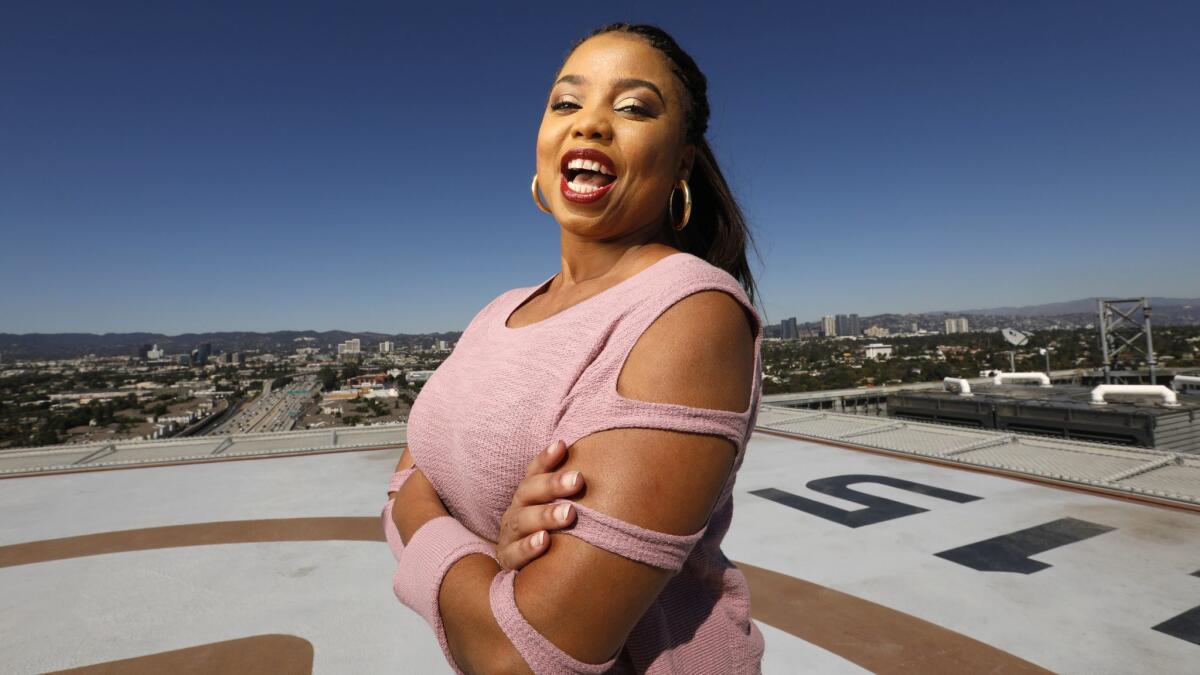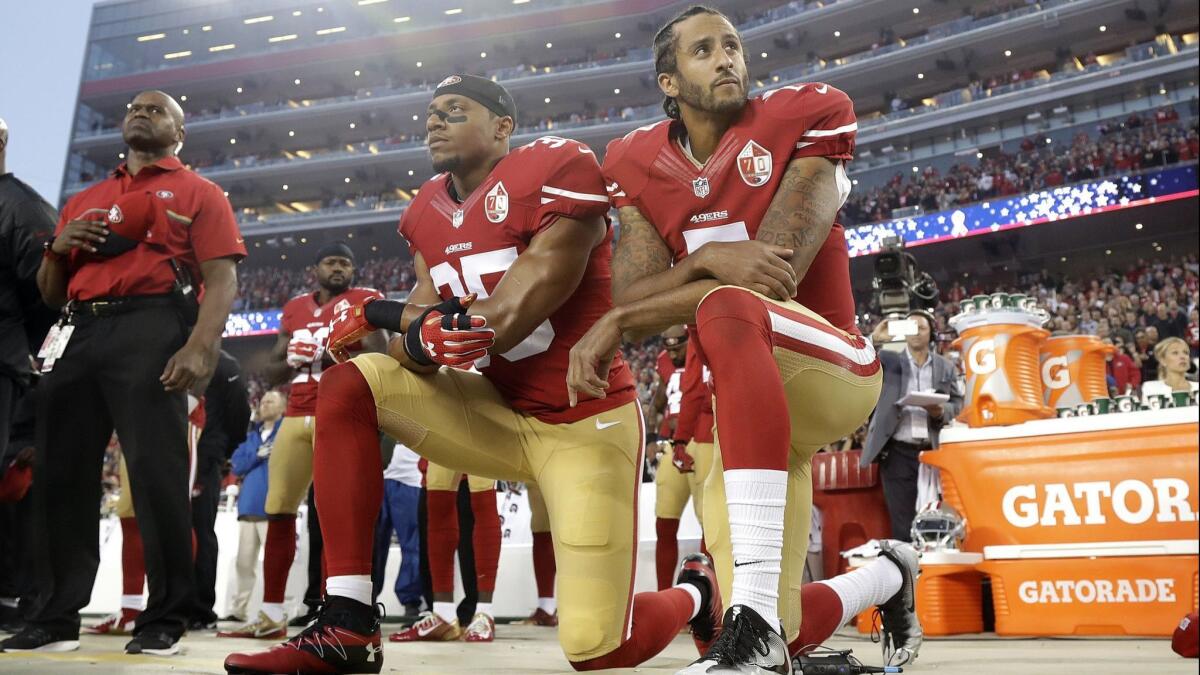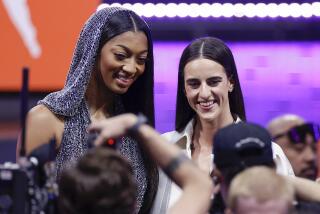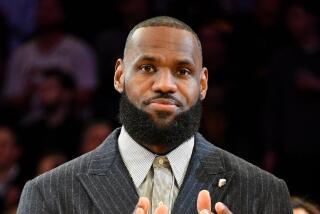A socially conscious voice in sports, Jemele Hill remains outspoken in Showtime’s new NBA documentary ‘Shut Up and Dribble’

- Share via
To paraphrase a line often attributed to Oscar Wilde — or, if you’d prefer, Dr. Who — you can always judge a person by the quality of their enemies.
By that measure, Jemele Hill and LeBron James reached a rarefied air in the past couple years, after the president of the United States used his Twitter account to attack then-ESPN anchor Hill and the world’s best basketball player.
For the record:
3:25 p.m. Nov. 6, 2018An earlier version of this story misspelled Dwyane Wade’s first name.
Also in this group, as Hill recounts during a recent talk at her manager’s office in West L.A.: Golden State guard Steph Curry, CNN’s Don Lemon and U.S. Rep. Maxine Waters (D-Los Angeles).
“We’re all in this club that’s quickly growing — and, by the way, everybody in the club basically looks alike,” she adds with a sly grin. “Except maybe Stormy Daniels.”
It’s the kind of unfiltered observation that got Hill in trouble with her bosses at ESPN, where she negotiated a departure from her contract last month. She was suspended for violating the company’s policy on social media, which included her suggestion of a fan boycott after the Dallas Cowboys attempted to institute a national anthem policy and calling the president a white supremacist. The president fired back at her by name on Twitter, and White House spokeswoman Sarah Huckabee Sanders called for her to be fired.
Last winter, James was just as direct, responding to Trump’s criticism of the NBA champion Golden State Warriors’ decision not to visit the White House with a tweet that began with “U bum” and culminated by saying, “Going to the White House was a great honor until you showed up.” As might be expected for one of the most famous people in the world— over 41 million followers and counting—James’ tweet was the platform’s most-shared of 2017.

Controversy, in both cases, ensued. But so did a connection between two members of this club, and one result was “Shut Up and Dribble,” which debuts Saturday on Showtime. Produced by James and his partner Maverick Carter and featuring Hill’s narration, the three-part documentary looks at the NBA not only as a cultural force, but one that stands unique among American sports leagues for its history of activism.
“The game itself also has always lent itself to individual expression, but the financial structure is very important,” says Hill, who worked at the Detroit Free Press and Orlando Sentinel before joining ESPN. “There are many dynamics in which players have more power than their coaches, their GMs and, in some cases — like LeBron James — even their owners.
“The NBA was ripe for athletes feeling comfortable to express who they are.”
The notion is reflected in “Shut Up and Dribble,” where at one point league commissioner Adam Silver describes feeling “incredibly proud” as players spoke out about issues important to them, which included James posing in dark hoodies with his Miami Heat teammates after the 2012 shooting of Trayvon Martin and a poignant, all-star address to open the 2016 ESPYs, where James, Dwyane Wade, Chris Paul and Carmelo Anthony advocated for greater athlete engagement with social issues.

Such sentiments have been subsequently echoed in remarks by championship-winning coaches such as the Warriors’ Steve Kerr and Gregg Popovich of the Spurs. But, as the documentary shows, such support wasn’t always the norm.
Roughly a year and a half in the making, “Shut Up and Dribble” began as a look at the NBA as a powerful pop cultural force, calling on voices such as Justin Timberlake and Kendrick Lamar to speak to its influence. That narrative changed earlier this year after Fox News host Laura Ingraham provided the show with its title when she directed James to stay out of politics.
“They call these things ‘unscripted’ for a reason,” said series director Gotham Chopra, who also directed the sports docs “Tom vs. Time” and “Kobe Bryant’s Muse.” “I think [social consciousness] is all buried into the genesis of the league. ... Athletes like Bill Russell and Oscar Robertson, who, as much as they were part of the league, they were also civil rights activists.”
With that narrative in mind, Hill became the natural choice as the central voice of the project. The Detroit-raised Hill was already on board as one of the documentary’s voices about the 2004 brawl between the Indiana Pacers and Detroit Pistons dubbed “Malice at the Palace.” But she was still in the process of departing ESPN, which would likely take issue with her narrating a documentary with such a clear point of view.
“I was like, ‘Just give me a couple of weeks,’” she says. “[The documentary] really caught me off guard but it was something I embraced because I believe in the story they’re trying to tell. As everybody in this town is particularly aware, LeBron James is really doubling down in this area at this time in his career. I mean, he’s a made man in the sports world, and just to see his evolution in terms of him finding his voice, feeling so empowered to use it, and by extension empowering other athletes and other people, period — so much of this project, it made sense for me to be a part of.”
(James, busy with his new job with the Los Angeles Lakers, was unavailable for this story.)
Hill’s recent trajectory can be seen in a similar light. Just three days into her own move to L.A. when we spoke, she recently started a production company with a scripted series in the works that’s loosely based on her longtime friendship with fellow writer Kelley L. Carter of ESPN’s “The Undefeated,” and there are plans for Hill to host her own sports and culture podcast. That’s in addition to a new job with the Atlantic, which hired her as a writer shortly after she left ESPN.
“Twenty-one years in this business as a professional, I’ve earned the right to be closely aligned in terms of values with whoever I choose to do business with,” Hill says. “You don’t always get that. ESPN and I were pretty close in that regard — until we weren’t.”
And while the NBA stands out in professional sports with its support for stars making political statements, that wasn’t always the case.
As shown in “Shut Up and Dribble,” the league was marred by its own institutional racism that included a controversial dress code that was in part a reaction to the Sixers’ Allen Iverson, whose fierce individuality lent the league a hip-hop swagger on and off the court.
In the ’90s, endorsement-minded stars like Michael Jordan weren’t so interested in rocking the boat, and players like Mahmoud Abdul-Rauf and Craig Hodges were treated as harshly for their statements as the NFL’s Colin Kaepernick, who remains out of the league since protesting racial inequality by kneeling during the national anthem.

“[NBA owners] have actually learned from their mistakes; I’ll give them credit for that,” Hill says. “There’s a part of me that has some skepticism. I think so much of it has to do with LeBron because he is who he is, and how he’s chosen to use his voice. Because, make no mistake, this league might feel differently if the best player were less outspoken.”
Though offering a three-hour snapshot of a sprawling subject, “Shut Up and Dribble” expresses how the NBA has functioned as a societal mirror in a way that baseball, football and hockey rarely achieve. The NBA particularly stands in stark contrast to the NFL, with its emphasis on conformity and conservative values.
“Part of it too is how the NFL has always marketed itself,” Hill says. “You talk to a lot of NFL coaches and they will describe the sport as ‘faith, family, football.’ And because the NFL has always doubled down as a value-oriented league, that’s why it feels the way that it does.
“The NBA has always been about melding and meshing cultures,” Hill adds. “That league, as long as the dynamic remains this way, is just going to feel a lot different and a lot more inclusive than the NFL.”
Bookended by Ingraham’s comments, “Shut Up and Dribble” is also striking as a document of how fans, journalists and political figures have long spoken to athletes. You can see it in the steely, impossibly patient look on Russell’s face as he’s asked whether he can be “objective” as the first black coach in the NBA, as well as in Oscar Robertson’s eyes as he testified before Congress in hearings that led to free agency for players.
“It just puts into context how black athletes in one way or another have always been sent the message, ‘Don’t you have it good enough?’” Hill says.
“While we have made some progress, it still does remind everybody of how dangerously close we are to what we used to be.”
‘Shut Up and Dribble’
Where: Showtime
When: 9 p.m. Saturday
Rating: TV-MA (may be unsuitable for children under the age of 17)
Follow me over here @chrisbarton.
ALSO:
More to Read
The complete guide to home viewing
Get Screen Gab for everything about the TV shows and streaming movies everyone’s talking about.
You may occasionally receive promotional content from the Los Angeles Times.







